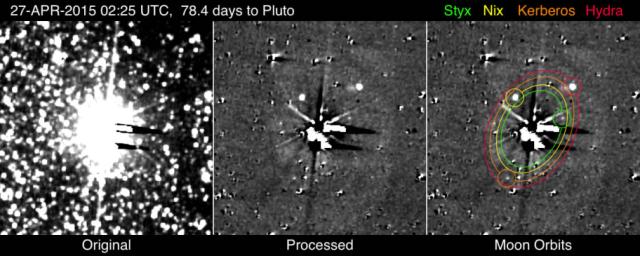
|
That Makes Five
- Click the image above for a larger view
- Full-Res JPEG (1125 x 450) (101.9 kB)
- Full-Res TIFF (1125 x 450) (1.5 MB)
Caption:
The images detecting Kerberos and Styx shown here were taken with New Horizons' most sensitive camera, the Long Range Reconnaissance Imager (LORRI), from April 25-May 1, 2015. Each observation consists of five 10-second exposures that have been added together to make the image in the left panel, and extensively processed to reduce the bright glare of Pluto and Charon and largely remove the dense field of background stars (center and right panels), in order to reveal the faint satellites, whose positions and orbits, along with those of the brighter moons Nix and Hydra, are given in the right panel.
Kerberos is visible in all of the images, though is partially obscured in the second image. Styx is not visible in the first image, only in subsequent ones; on April 25 it was obscured by electronic artifacts in the camera -- the black and white streaks extending to the right of the extremely overexposed images of Pluto and Charon in the center of the frame. These artifacts point in different directions in different images due to the varying orientation of the spacecraft. Other unlabeled features in the processed images include the imperfectly removed images of background stars and other residual artifacts.
Although Styx and Kerberos are more visible in some frames than others, perhaps due to brightness fluctuations as they rotate on their axes, their identity is confirmed by their positions being exactly where they are predicted to be (in the center of the circles in the right panel).
Cataloging Keywords:
| Name | Value | Additional Values |
|---|---|---|
| Target | Pluto | Charon, Hydra, Kerberos, Nix, Styx |
| System | Pluto | Kuiper Belt |
| Target Type | Satellite | Dwarf Planet, KBO |
| Mission | New Horizons | |
| Instrument Host | New Horizons | |
| Host Type | Flyby Spacecraft | |
| Instrument | Long Range Reconnaissance Imager (LORRI) | |
| Detector | ||
| Extra Keywords | Color, Rotation, Visual | |
| Acquisition Date | ||
| Release Date | 2015-05-12 | |
| Date in Caption | 2015-05-01 | |
| Image Credit | NASA/Johns Hopkins University Applied Physics Laboratory/Southwest Research Institute | |
| Source | photojournal.jpl.nasa.gov/catalog/PIA11774 | |
| Identifier | PIA11774 | |
